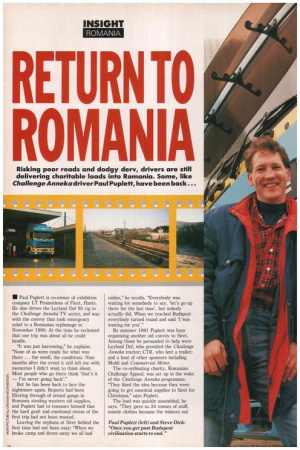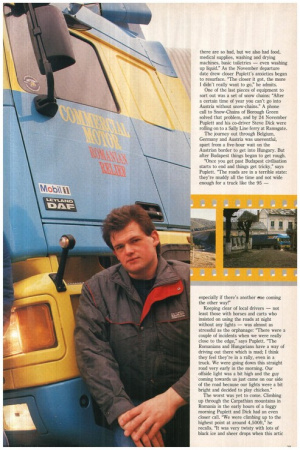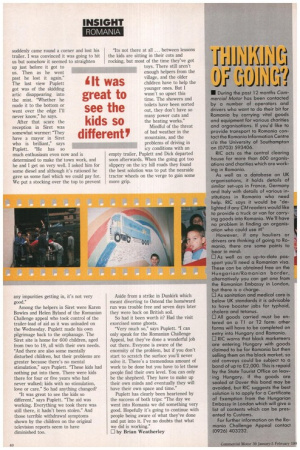RETURN TO ROMAN IA
Page 40

Page 41

Page 42

If you've noticed an error in this article please click here to report it so we can fix it.
Risking poor roads and dodgy derv, drivers are still delivering charitable loads into Romania. Some, like Challenge Anneka driver Paul Puplett, have been back ...
• Paul Puplett is co-owner of exhibition company LT Promotions of Fleet, Hants. He also drives the Leyland Daf 95 rig in the Challenge Anneka TV series, and was with the convoy that took emergency relief to a Romanian orphanage in November 1990. At the time he reckoned that one trip was about all he could handle.
"It was just harrowing," he explains. "None of us were ready for what was there ... the smell, the conditions. Nine months after the event it still left me with memories I didn't want to think about.
z Most people who go there think 'that's it 9, I'm never going back'."
But he has been back to face the a nightmare again. Reports had been ; filtering through of armed gangs in Romania stealing western aid supplies, • and Puplett had to reassure himself that
the hard graft and emotional stress of the '•=1 first trip had not been wasted.
u Leaving the orphans at Siret behind the 3 first time had not been easy: "When we 2 • broke camp and drove away we all had radios," he recalls. "Everybody was waiting for somebody to say, 'let's go up there for the last time', but nobody actually did. When we reached Budapest everybody turned round and said 'I was waiting for you'."
By summer 1991 Puplett was busy organising another aid convoy to Siret. Among those he persuaded to help were Leyland Oaf, who provided the Challenge Anneka tractor; CTR, who lent a trailer; and a host of other sponsors including Mobil and Commercial Motor.
The co-ordinating charity, Romanian Challenge Appeal, was set up in the wake of the Challenge Anneka programme. "They liked the idea because they were going to get essential supplies to Siret for Christmas," says Puplett.
The load was quickly assembled, he says. "They gave us 24 tonnes of stuff, mainly clothes because the winters out there are so bad, but we also had food, medical supplies, washing and drying machines, basic toiletries — even washing up liquid." As the November departure date drew closer Puplett's anxieties began to resurface. "The closer it got, the more I didn't really want to go," he admits.
One of the last pieces of equipment to sort out was a set of snow chains: "After a certain time of year you can't go into Austria without snow-chains." A phone call to Snow-Chains of Borough Green solved that problem, and by 24 November Puplett and his co-driver Steve Dick were rolling on to a Sally Line ferry at Ramsgate.
The journey out through Belgium, Germany and Austria was uneventful, apart from a five-hour wait on the Austrian border to get into Hungary. But after Budapest things began to get rough.
"Once you get past Budapest civilisation starts to end and things get tricky," says Puplett. The roads are in a terrible state: they're muddy all the time and not wide enough for a truck like the 95 — especially if there's another ene coming the other way!"
Keeping clear of local drivers — not least those with horses and carts who insisted on using the roads at night without any lights — was almost as stressful as the orphanage: "There were a couple of incidents when we were really close to the edge," says Puplett. "The Romanians and Hungarians have a way of driving out there which is mad; I think they feel they're in a rally, even in a truck. We were going down this straight road very early in the morning. Our offside light was a bit high and the guy coming towards us just came on our side of the road because our lights were a bit bright and decided to play chicken."
The worst was yet to come. Climbing up through the Carpathian mountains in Romania in the early hours of a foggy morning Puplett and Dick had an even closer call. "We were climbing up to the highest point at around 4,500ft," he recalls. "It was very twisty with lots of black ice and sheer drops when this artic suddenly came round a corner and lost his trailer. I was convinced it was going to hit us but somehow it seemed to straighten up just before it got to us. Then as he went past he lost it again." The last view Puplett got was of the skidding artic disappearing into the mist. "Whether he made it to the bottom or went over the edge I'll never know," he says.
After that scare the reception in Siret was somewhat warmer: "They have a mayor in Siret who is brilliant," says Puplett. "He has so much enthusiasm even now and is determined to make the town work, and he and I get on very well. I asked him for some diesel and although it's rationed he gave us some fuel which we could pay for. We put a stocking over the top to prevent any impurities getting in, it's not very good."
Among the helpers in Siret were Karen Bowles and Helen Hyland of the Romanian Challenge appeal who took control of the trailer-load of aid as it was unloaded on the Wednesday. Puplett made his own pilgrimage back to the orphanage. The Siret site is home for 600 children, aged from two to 19, all with their own needs. "And there are also some mentally disturbed children, but their problems are greater because there's no mental stimulation," says Puplett. "These kids had nothing put into them. There were kids there for four or five years who had never walked; kids with no stimulation, love or care." So had anything changed?
"It was great to see the kids so different," says Puplett. "The aid was working. Everything we took there was still there, it hadn't been stolen." And those terrible withdrawal symptoms shown by the children on the original television reports seem to have diminished too. "Its not there at all ... between lessons the kids are sitting in their cots and rocking, but most of the time they've got toys. There still aren't enough helpers from the village, and the older children have to help the younger ones. But I wasn't so upset this time. The showers and toilets have been sorted out, they don't have so many power cuts and the heating works."
Mindful of the threat of bad weather in the mountains, and the problems of driving in icy conditions with an empty trailer, Puplett and Dick departed soon afterwards. When the going got too slippery on the icy hill roads they found the best solution was to put the nearside tractor wheels on the verge to gain some more grip.
gams
Aside from a strike in Dunkirk which meant diverting to Ostend the homeward run was trouble free and seven days later they were back on British soil.
So had it been worth it? Had the visit exorcised some ghosts.
"Very much so," says Puplett. "I can only speak for the Romanian Challenge Appeal, but they've done a wonderful job out there. Eveyone is aware of the enormity of the problem, but if you don't start to scratch the surface you'll never solve it. There's a tremendous amount of work to be done but you have to let these people find their own level. You can only be the shepherd. They have to make up their own minds and eventually they will have their own space and time."
Puplett has clearly been heartened by the success of both trips: "The day we went into Romania we did something very good. Hopefully it's going to continue with people being aware of what they've done and put into it. I've no doubts that what we did is working."
LI by Brian Weatherley
















































































